This article has links to products and services we love, which we may make commission from.
Me casa, su casa, as they say in… every country but especially in Cuba. Staying with locals is part of the Cuba travel experience and the types of accommodation that you book are called casa particular or casas particulares (plural).
Stay with Cubans for an authentic while supporting the community and saving some of your travel budget too! This guide explains what casas are, shares our experience, discusses where to stay in Cuba and finally, other forms of accommodation on the island which you can book too.
» You may also like | How to plan a trip to Cuba
1. What is Casa Particular?
Casas particulares are a form of accommodation in Cuba.
They are extremely popular with tourists as you get to live in a local’s house in the heart of the destination.
Casas are completely legal as owners sign up to have the right to rent out a room in their home or a full house if they have one.
Many offer breakfast making them essentially a B&B.
Some of the best places to stay in Cuba are actually casas which is great because hotels are expensive.
2. How Do I Find Casas Particulars?
If you are relaxed, arrive in Cuba and wander about the touristy areas.
Someone will stop you and ask if you need help/want to buy cigars! Decline the cigar offer but ask if they can help you find a casa.
This is completely normal and I know it is not the way you normally travel.
They’ll take you to a friend’s casa free of charge. Payment will be made by the casa owner in the form of commission. You will experience this exchange all over Cuba for a variety of services such as taxis, class car tours, bike rental, etc.
We let fate decide our casa during our second visit to Havana and felt confident doing so after three weeks in Cuba.
A local in a tuk-tuk cycled around a couple of options until we found one.
Once you are in a casa, the host can suggest casas in the next town you are moving on to.
They have a network of ‘friends’ who look out for each other.
We booked our casa in Viñales through our accommodation in Havana.
I know this sounds totally alien to us but it is honestly the norm for tourism in Cuba.
→ Note: The majority of casa owners do not speak English. Work on your survival Spanish before you go. Here are 5 ways to learn Spanish without leaving the house.
3. Are Casas Particulares Legal?
We got the impression that in the past casas were a bit ‘under the table.’
People who have not been to Cuba (but like to think they know everything there is to know about the country, yeah those types) appear to think that casas are a secret network of housing.
This really isn’t the case!
If a house has an upside-down anchor sign outside, then they have registered with the government as a casa.
The owner pays some form of tax to the government and the guest will get a receipt.
Owners usually take your passport number for their records. There is a receipt/tax record book they complete.
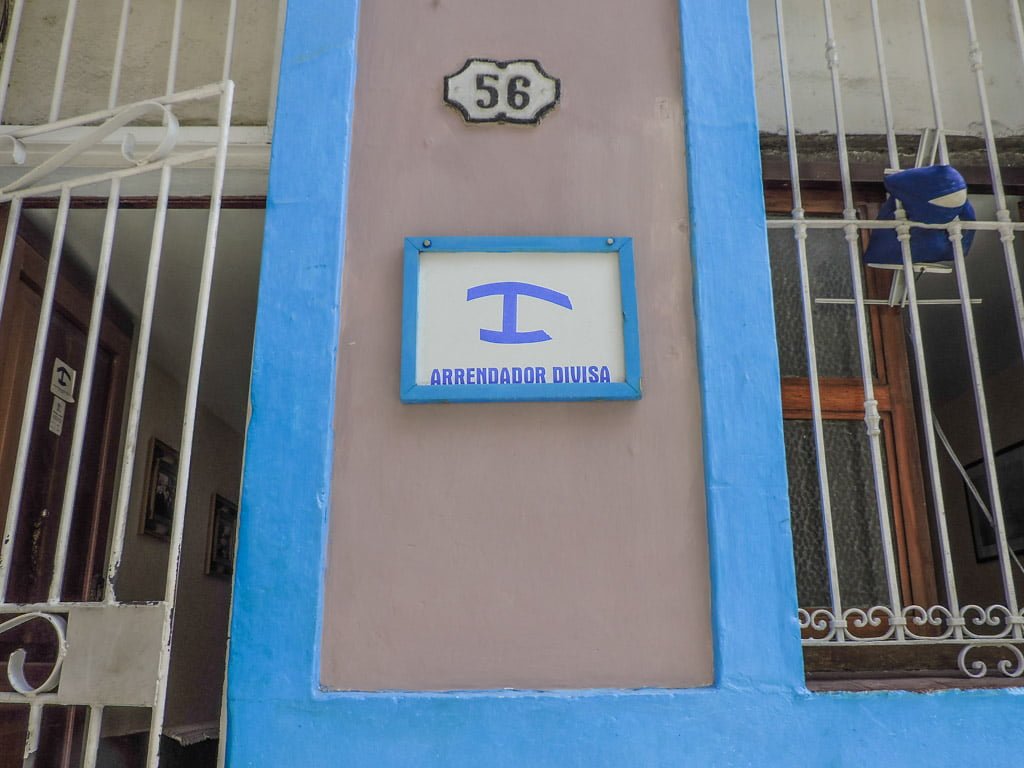
4. What Are Casas Particulares Like?
Casas all differ!
In Viñales, Sara and Jorge’s casa is painted blue. It has a porch with rocking chairs and wait for it… four beds in the spare room!
This was our first experience of a casa so we were surprised to see more of a hostel dorm set up.
In Caleton near the Bay of Pigs where we went diving, the owner doesn’t live in the house.
This is her second home which she uses purely for rent.
There is a porch, back garden with a washing line, kitchen, three double bedrooms and a bathroom.
We stayed with Jacqueline for four nights in Trinidad.
She has a private room with a bathroom and a fridge. There is another dorm-style room which our friend Sarah rented to herself.
Jacqueline and her family (the gran down to the kids) live in another part of the house.
She has a beautiful garden where you eat breakfast every morning amongst the flowers.
During our second visit to Havana, we stayed with Ramon and Rachel on Picota (#18), again we had a fridge and a private bathroom.
Rooms are basic, you have understand that before visiting.
→ Breakfast is usually an additional fee.
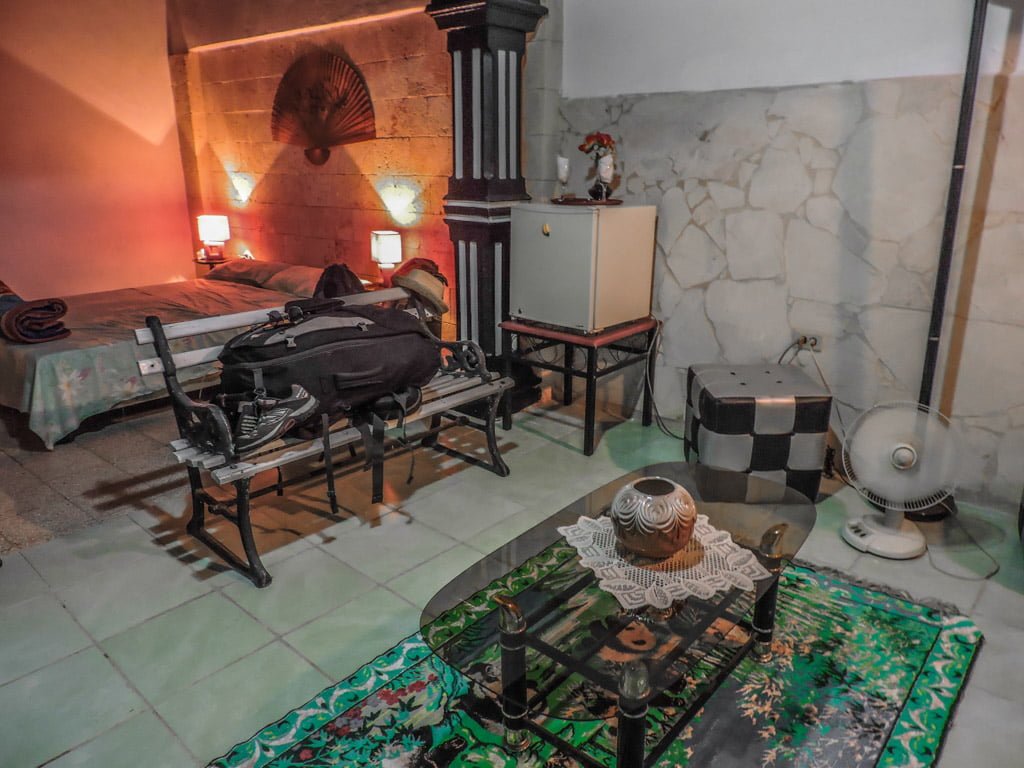
Rachel changed our bedding more frequently than hotels do
5. How Much Do Casas Particulares Cost?
Online and in guidebooks the average advised price is 10 to 30 USD per room.
We quickly found out that there is little difference between rooms at 30 and 10 USD per person.
Use your bargaining skills. If the owner is set on a price, feel free to move on – casas particulares in Cuba are in abundance.
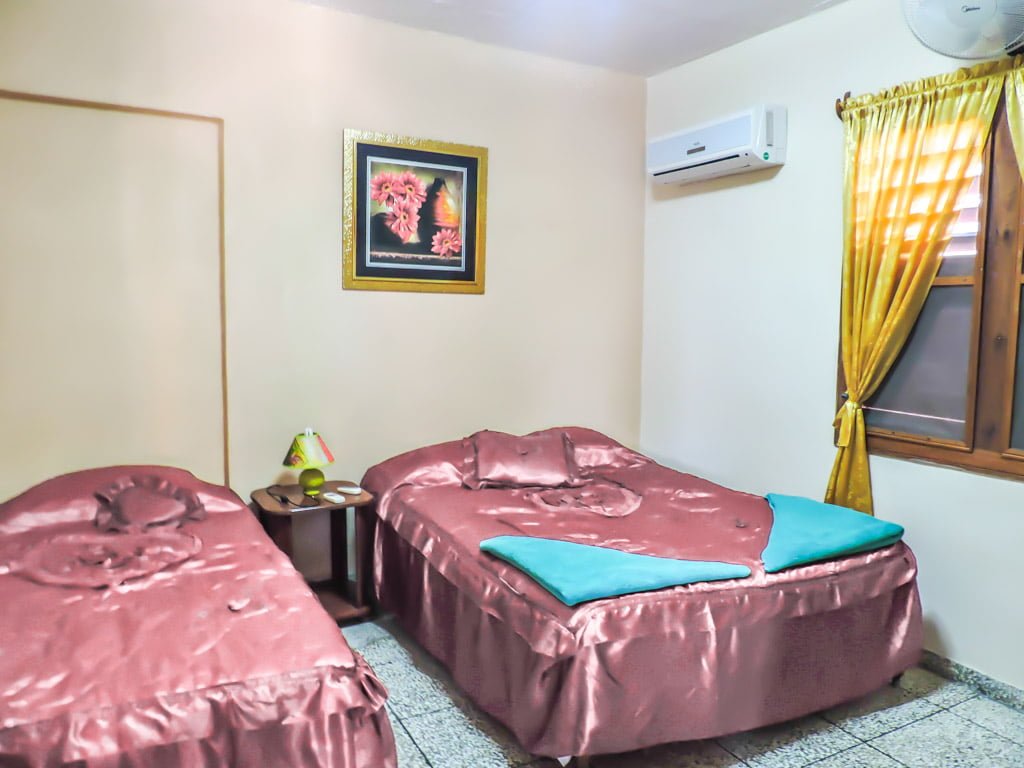
Caleton casa – for two!
6. What About Meals?
Again, this differs between casas.
Breakfast is usually an additional fee of 2-5 USD for eggs, toast and fruit. Some casas serve platters!
One of our hosts didn’t have margarine one day because the shop didn’t have any. This happens!
Remember many Cubans live from government rations and they use renting rooms or taxi colectivo (Cuban taxi service) services to bump up their wages.
Unless you are willing to dine out in Cuba for all three meals, you are limited as there are no grocery stores which you may be accustomed to at home. Bring snacks from home.
However, you will find fruit and veg carts/markets around Havana.
It is very unlikely you access to a kitchen too which may make travel a challenge for vegetarians/vegans, long-term backpackers and families with small children.
Dinners in casas are supposed to be outstanding but during our trip, only one owner offered us the option.
7. How Do I Pay?
Most casas will expect a cash payment and you will agree the price and currency after you have looked at the room.
You can read all about the currency in Cuba here.
Alternatively, you can pre-book casas on third party websites.
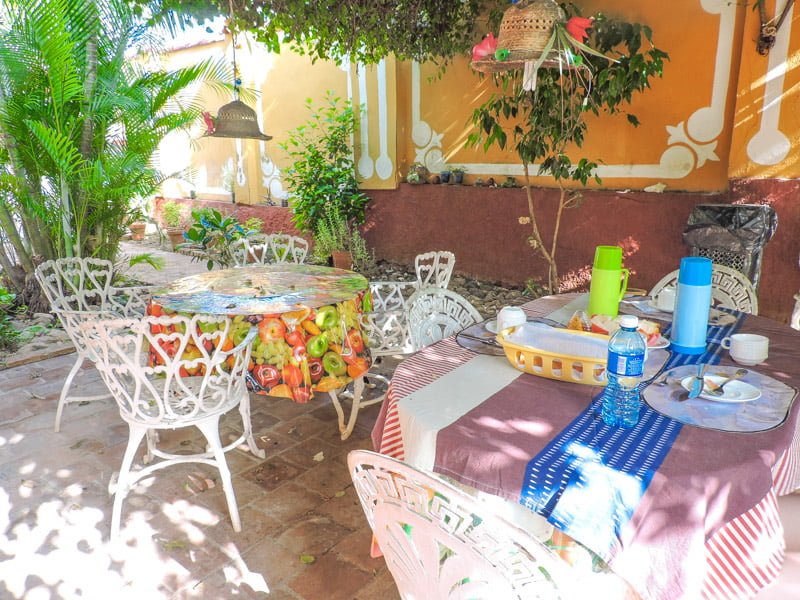
8. Arguments For and Against Staying in a Cuban Casa
Pros
- You live like a local
- The rooms are clean
- You are helping the local economy
- Breakfast is provided for a cost
- Hotels are expensive
- Hostels are not common out with Havana
Cons
- No kitchen
- Living in someone else’s house (mostly)
9. Airbnb in Cuba
There are lots of casas available via Airbnb in Cuba and the average price for a private room for two is 30 USD.
Remember, Cuba has basically been running Airbnb before the apartment rental company was born!
Since the 90s, locals have been renting out rooms so don’t be afraid of using their direct word-of-mouth systel.
There are a few issues we need to address about Airbnb in Cuba so you are armed with knowledge before you book:
- The Airbnb app doesn’t work in Cuba so you can’t use it to contact hosts when you arrive
- Airbnb has been running in Cuba unofficially since the 90s! Casa owners create a network throughout the island and call ahead to book for you, they get commission in return
- It is not uncommon for the casa booked for you to get a better deal (a longer stay) so you are moved elsewhere and you might not know it. Naturally, you will know it if you book via Airbnb
- Read the reviews to check whether the amenities promised are provided. Hot tubs, doubt it!
- Casa owners are now advertising over different search engines like Airbnb, Booking, TripAdvisor, Hostelworld, etc and WiFi is not as readily available so the response may be slower than accustomed to
- This is also the case for casa owners updating when rooms are booked/casas are sold out
Reasons for booking with Airbnb
- Pre-booking a casa obviously gives you peace of mind
- You can pre-pay by credit card with Airbnb, less cash required – read our guide to currency in Cuba here
- Airbnb is popular, we trust the resource and customer service is generally on the side of the customer
- Properties have reviews
10. Where to Stay in Cuba
Here are the top-rated casas which you can pre-book via Booking.com and TripAdvisor.
Casa Particular, Havana
Wondering where to stay in Cuba but not interested in expensive hotels? Here’s a list of the most popular casas:
- Casa Colonial: Heart of Old Havana, big room, good breakfast
- Casa Colonial La Terraza: Affordable casa, friendly family-run with 5/5 rating on TripAdvisor
- La Villa Teresa: This is an actual palace with a pool. Outstanding reviews on TripAdvisor
Casa Particular Viñales
- Villa Sara y Jorge: Four-bed dorm-style room. Outstanding breakfast. Chairs on porch
- Casa El Porry: Incredible views from the rooftop where breakfast is served, wheelchair friendly. 5/5 on TripAdvisor
Casa Particular, Varadero
Varadero is predominantly an area packed with all-inclusive resorts but there are a handful of casas too:
- Casa Arletty Santa Marta: Friendly family, nice rooms, bikes to rent and cycle to the beach. 5/5 on TripAdvisor
- Casa Bella Mar Hab. 2: Hosts Erick Y Ely offer a clean casa with nice backyard
Casa Particular, Cienfuegos
- Hostal Marina: Top quality, internet access, rooftop.
- Hostal Rivero and Novoa: Excellent hosts, nice terrace.
Casa Particular, Trinidad
- Hostal Yaquelin Arrechea: Gorgeous garden where breakfast is served, big rooms
Casa Particular, Santiago de Cuba
- Hostal Amanecer Cubano: Beautiful home hosted by Eloy
- Casa Liñero (Habitacion en Terraza): Hammocks for chilling
11. Other Accommodation in Cuba
There are a number of hotels in Cuba, especially all-inclusive resorts around the Caribbean sea.
Hostels are lesser-known and primarily found in Havana.
Confusingly, casa owners use the term ‘hostal’ in the casa name often.
12. Hotels in Cuba
Havana Hotels
Alternatively, if you’d prefer to stick to hotels in Havana, there are many to choose from but at a hefty price.
- Hotel National: Historically important hotel in Havana, lovely gardens, not in walking distance to Old Havana
- Hotel Sevilla: Excellent location, very nice pool area which we used on our last day in Havana
Trinidad Hotels
- Iberostar Trinidad: Grand rooms with aircon, starts at $400 USD for one night
13. Hostels Cuba
The following hostels have dorm rooms and social spaces in Havana. If arriving solo and looking to meet friends I highly recommend staying in a hostel first and meeting travel buddies as casas can be very private.
- Club 58: Outstanding reviews, friendly staff, very social, super central and safe
- Ronaldo’s: This is the first hostel in Havana and a bit of an institution. Nice rooftop. Friendly staff
- Paradise: This is where we stayed for two nights as Ronaldo’s was full. Nice rooftop. Hot rooms
Going to Cuba?
Pin to your board
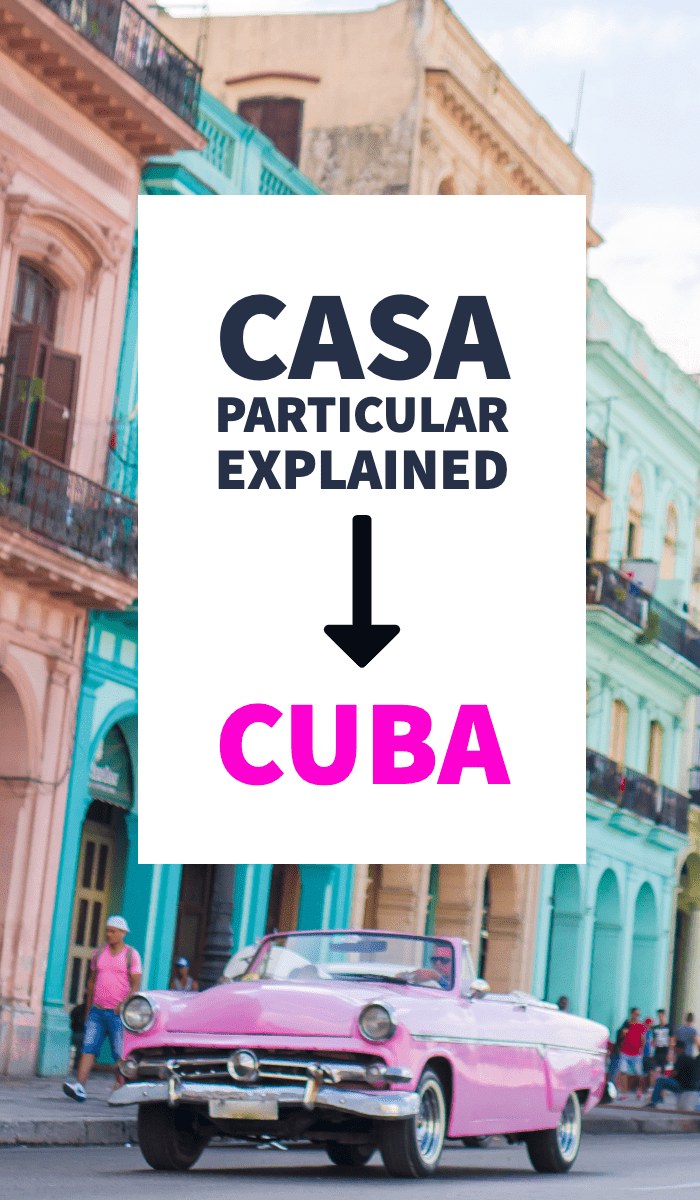
Final Words
The types of Cuba accommodation are pretty unique I think you will agree. From casas to hostels, hotels to all-inclusive resorts there is variety to choose from but we urge you to get out of your comfort zone and stay with a local at their casa particular so you can experience a bit of culture and help out the community too.
Over to you – any questions or points to make?

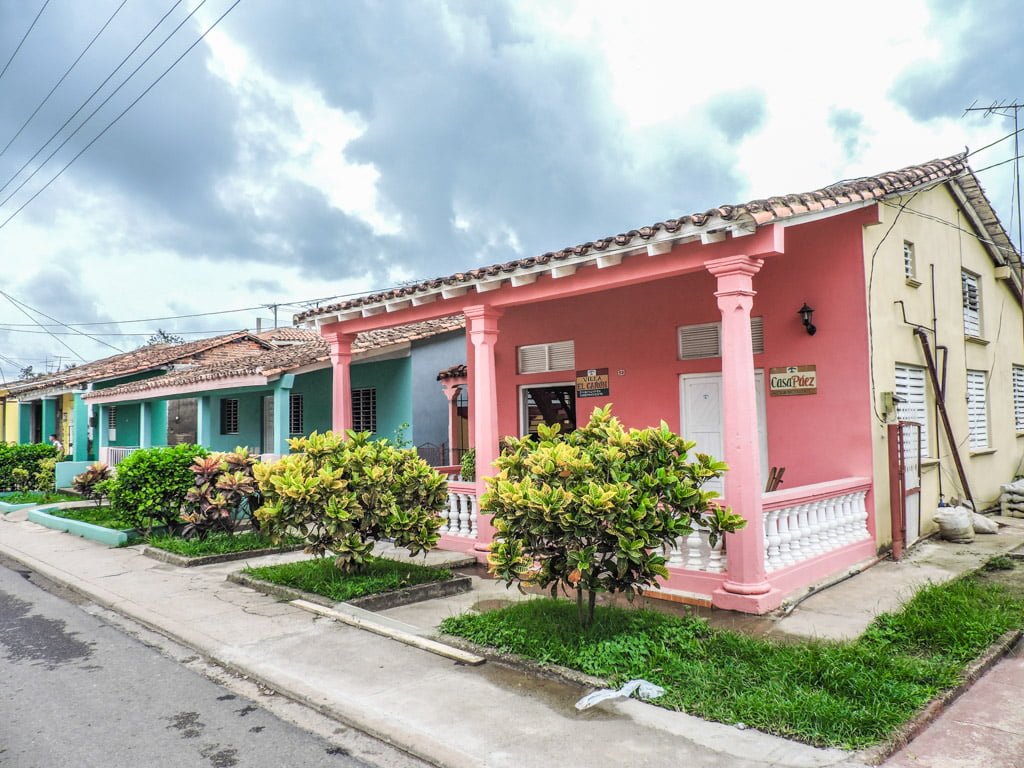
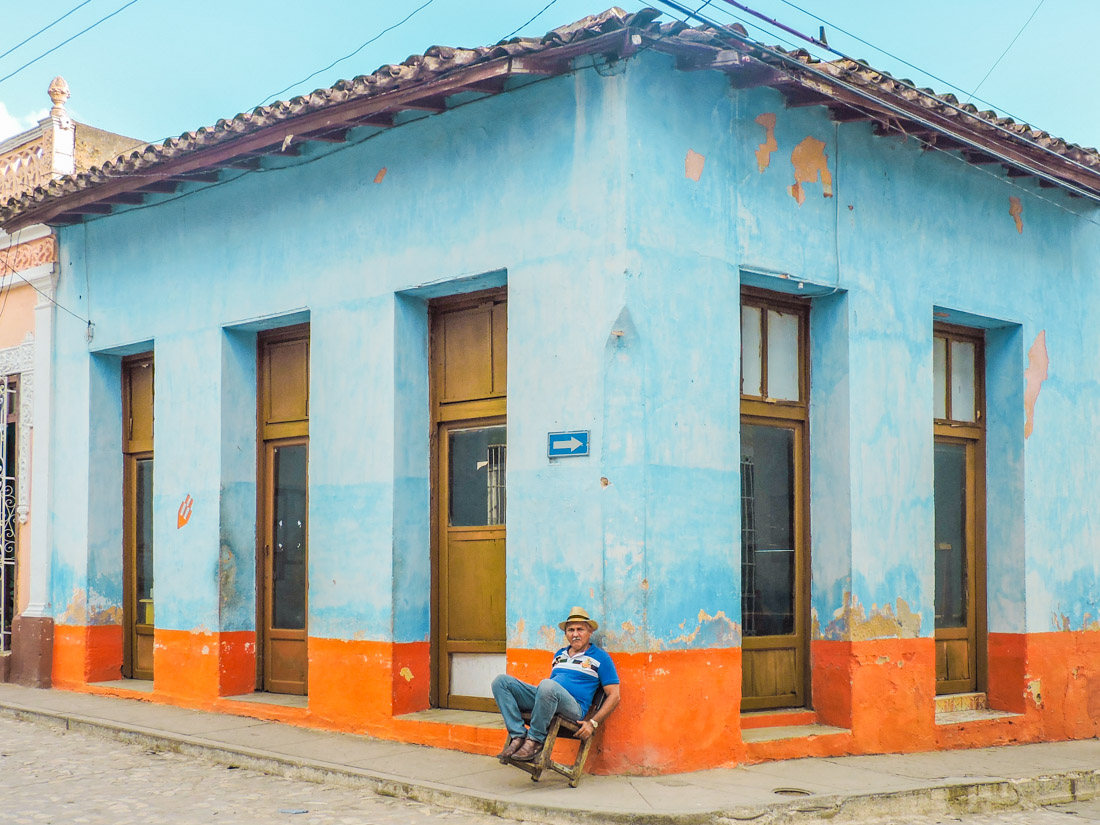
OCTOBER 9, 2020
DO WE KNOW – AT THIS POINT – IF CASAS PARTICULARES ARE GOING TO ACCEPT FOREIGNERS IN NOVEMBER 2020. I AM PLANNING TO GO TO HOLGUIN TO A CASA THAT I KNOW BUT I AM NOT SURE IF CUBA IS OPEN TO INFORMAL TOURISTS (NOT GOING TO THE BEACH WITH A PACKAGE).
THANK TOU FOR YOUR HELP
Hi Gilles. I think the best best is for you to choose a casa that you plan from guide that is on Airbnb and ask them directly. If someone asked me a question about borders for Scotland next month I would say things are changing so rapidly here I couldn’t give you an answer.
Hi guys
Love your pages. I have been once, to Villas Jibacoa, a small resort in a rural area midway between Havana and Varadero. LOVED IT and the country and people.
On scams: we took two all day trips in old cars, one to Havana and one to Varadero. We were told to agree on a price in advance and insist on an english speaking guide. The drivers and cars were awesome but our guides (two young ladies) were worth their weight in gold. Very knowledgeable on history, took us to some cool spots not on the mass tours, but most importantly steered us clear of a LOT of scams such as the girls that kiss you in Havana for $, old ladies in doorways smoking cigars who will insist $ after you snap their pic, guitarists and an old guy with a doggie dressed up who also want money AFTER you snap that pic. $60-70 US or CDN for an entire day! Less than it would have cost for two to travel on the bus tours with one guide for 30-40 people. I want to stay in the same resort for 2 – 3 weeks this winter but spend a few days travelling to casas in Havana and Vinales etc. Thanks for the tips. Cheers! Tim in NB Canada
Hey Tim from my spirit country, Canada! Ah, you make me want to visit Cuba again with this chat. Even the scams 😉 Thanks for sharing.
Hey! Thank you for the detailed guide.
What is the most economical and quickest way to travel in Havana and Havana to Trinidad and Vinales? We are a couple should be using a bike in Havana and rent a car for Havana to other cities or take the local bus?
It would be great if you can share the expected cost with us.
Hey Ruhi. The bus can be the most economical way to get around however the times may not suit. The other alternative is to hire taxi collectivos which cost us $25 each every time we moved between towns/cities. The car had other tourists in it too. The benefit was that it was door to door.
If hiring a car do so in Havana but don’t expect to get one the day you request it, you might have to wait a few days.
Here’s a good introduction to Cuba guide.